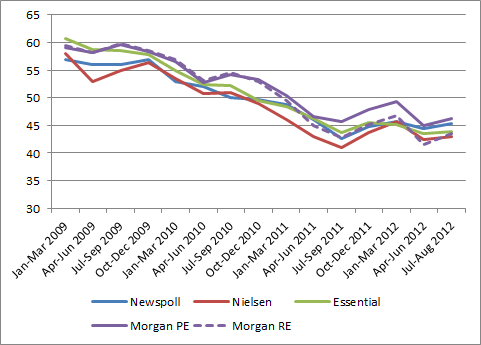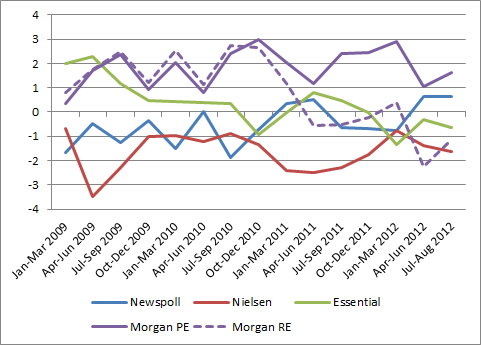James J relates that Newspoll has Labor up further on a surprisingly strong result a fortnight ago: the Coalition’s two-party preferred lead is down from 54-46 to 53-47, and the primary votes are 35% for Labor (up two), 45% for the Coalition (steady) and 11% for the Greens (up one). Labor was last this high on two-party preferred in March, and on primaries when Labor enjoyed a brief spike in the days before Kevin Rudd’s leadership challenge. Despite this, Julia Gillard’s personal ratings have weakened still further, her approval down two points to 27% and disapproval up one to 60%, while Tony Abbott continues what seems to be a steady upward trend over recent months: his approval is up two to 34% and his disapproval is down two to 54%. And on another counter-intuitive note, the latest poll nonetheless has Julia Gillard drawing level on preferred prime minister at 38% apiece, compared with a 38-36 lead for Abbott last time.
UPDATE: Morgan’s face-to-face poll covering the last two weekends also gives Labor it’s best result since March: their primary vote is up 2.5% to 34.5%, although the Coalition is also up half a point to 44%, with the Greens down 1.5% to 10%. On two-party preferred, the Coalition lead is down from 56-44 to 54-46 on respondent-allocated preferences and 53.5-46.5 to 53-47 on previous election preferences.
Newspoll having turned in results which look relatively kind to Labor twice in a row, I thought now might be a good time to review the recent performance of the pollsters relative to each other. I have done this by calculating averaged quarterly results for each regularly reporting pollster going back to the start of 2009 (with separate results included for the respondent-allocated and previous-election figures from Morgan’s face-to-face polls). The first chart shows the progress over that time of Labor’s two-party vote.
This shows an impressive consistency of trends once weekly/fortnightly/monthly fluctuations are ironed out. The closest we get to an aberration is the April-June 2009 result from Nielsen, which conducted only one poll in that period. A clearer indication of pollsters’ “house biases” can be provided if we convert the results into deviations from the average of the four pollsters (using the previous election measure for Morgan for the sake of consistency).
This indeed shows that Newspoll has lately been more generous to Labor than at any other point in the time covered, but the difference with Essential Research is still fairly modest. Nielsen, it would seem, has reliably been a point or two worse for Labor than Newspoll over the entire period. Essential favoured Labor in the early days of operation, apparently due to methodological teething problems, but has closely matched Newspoll throughout the current parliamentary term. It is true that a gap has opened in the two most recent observations, but I would want to see this continued over a longer time frame before reading much into it.
The widely recognised lean to Labor in Morgan-face-to-face polls is shown up fairly clearly on the respondent-allocated result, although the other pollsters “caught up” with it at the peak of the Rudd honeymoon. As I’ve probably said about a million times now, the gap which opened up between respondent-allocated and previous-election two-party results in early 2011 is an inexplicable quirk of Morgan’s. The respondent-allocated results produced by Nielsen show no such pattern, and if I had gone to the bother of including separate measures, it would have hugged the previous-election line as closely as Morgan’s did over the first half of the chart.
Taken together, the average two-party results for Labor since the 2010 election have been 45.9% from Newspoll, 44.2% from Nielsen, 45.7% from Essential, 48.1% from Morgan previous-election, and 45.9% from Morgan respondent-allocated.
Other polls:
• Essential Research has primary votes unchanged on last week, at 32% for Labor, 49% for the Coalition and 10% for the Greens, although rounding has resulted in an increase in the Coalition’s two-party lead from 56-44 to 57-43. Also featured are questions on power prices, with 37% thinking power companies most responsible against 28% for the federal government and 23% for state governments; price increases under the carbon tax, which 52% (including 68% of Coalition voters) say they have noticed and 36% say they haven’t; and the various aspects of the Houston report recommendations, which find very strong support for limiting the ways boat arrivals can bring their families to Australia, opinion divided on increasing the humanitarian program and strong opposition to the Malaysia solution, but strong approval for implementing them all as per the new government policy.
• Channel Nine in Brisbane tonight reported results of a statewide ReachTEL automated phone poll of over 1000 respondents, which showed the LNP on 42.2% (compared with 49.6% at the election), Labor on 31.6% (26.7%), Katter’s Australian Party on 9.6% (11.5%) and the Greens on 9.2% (7.5%), for an LNP lead of 56-44 (62.8-37.2) on two-party preferred. Daniel Hurst of Fairfax has more results from the poll, including the finding that Campbell Newman’s disapproval rating (42%) has nearly shaded his approval (44%). This adds to the impression from Morgan polling (see below) and last fortnight’s ReachTEL Ashgrove poll of a solid shift away from the LNP over recent months, albeit nowhere near enough to threaten their lead.
• Morgan has published a headache-inducing release on state voting intention which details results from various small-sample phone polls conducted over the past two months. Last week they polled between 319 and 343 respondents in each of the four biggest states; a month ago they polled 648 respondents nationally for a poll on “the most important public problems facing Australia”, from which tiny state-level sub-samples have been derived for comparing the latest results with. Every individual set of results is from too small a sample to be of much use, but you can see them all here if you’re interested. They can at least be used to derive combined July-August results for New South Wales and Victoria from passable samples of just below 500 and margins of error of around 4.5%. For New South Wales, the results are Coalition 54%, Labor 25% and Greens 10%, with the Coalition leading 61-39 on two-party preferred; for Victoria, Coalition 45%, Labor 35% and Greens 12%, with the Coalition leading 51-49. In each case Labor and the Greens get similar results to the previous elections, but the Coalition are three points higher on the primary vote in New South Wales and four points lower in Victoria.
• Jamie Walker of The Australian reports research conducted for Labor by UMR Research in March found Clive Palmer was viewed favourably by 26% of men and 16% of women, and unfavourably by 35% of men and 22% of women. Forty-two per cent of women and 26% men said they had never heard of him.
Preselections:
• Barnaby Joyce said last week he would “definitely” run for preselection in the outback Queensland seat of Maranoa if its 68-year-old incumbent, Bruce Scott, decided not to seek another term. Should Scott remain intransigent, he will “seek the counsel of party people in the electorate”.
• The NSW Nationals have confirmed state independent Richard Torbay as their candidate to take on Tony Windsor in New England.
• Fairfax reports Jane Prentice, the LNP member for the Brisbane seat of Ryan, faces preselection challenges from Jonathon Flegg, son of state government minister and former Liberal leader Bruce Flegg, and pharmacist John Caris.
• The ABC reports that Michael Burr withdrew as Liberal candidate for the northern Tasmanian marginal seat of Braddon last month, a fact which escaped by notice when I compiled my “seat of the week” entry a fortnight later. The front-runner to replace him would appear to be Brett Whiteley, who held a state seat in Braddon from 2002 until his defeat in 2010. Former Senator Guy Barnett says he was approached to fill the vacancy, but is instead focusing on entering state politics. The two unsuccessful candidate for the original preselection, veterans advocate Jacqui Lambie and Poppy Growers Tasmania president Glynn Williams, have indicated they might try again.
• Barry Kennedy of the Sunbury Leader reports Sunbury businessman Ben Collier and two other candidates will contest Liberal preselection for McEwen on the weekend. Rob Mitchell gained the seat for Labor at the 2010 election and scored a free-kick at the redistribution to take effect at the next election, which adds Labor-voting Sunbury to the seat and boosts his margin from 5.3% to 9.2%.
• Warring factions in the NSW Liberal Party are reportedly negotiating a compromise after a “hard Right” push to entrench preselection plebiscites led to fears numerous sitting MPs would be targeted with branch-stacking. Together with a raft of state MPs, Sean Nicholls of the Sydney Morning Herald reported those affected might include Philip Ruddock in Berowra, Scott Morrison in Cook, Bronwyn Bishop in Mackellar and Alex Hawke in Mitchell. Heath Aston of the Sun-Herald reports the compromise would likely involve sitting members being protected, branch members required to be members for two years before being entitled to a plebiscite vote, limitations on state executive’s power to impose candidates and, in a concession from the hard Right, a requirement for direct attendance at elections for state executive positions to guard against postal vote rorting. At the root of the dispute is the decision by state executive, which is dominated moderates and the centre Right, to impose centre Right candidate Lucy Wicks in the seat of Robertson.
• Shannon Tonkin of the Illawarra Mercury reports John Rumble, a Wollongong nurse and son of former local state MP Terry Rumble, will challenge incumbent Stephen Jones for Labor preselection in Throsby. It had been widely reported that the Right was gathering strength in local branches in preparation for a push by Mark Hay, son of state Wollongong MP Noreen Hay, but he announced earlier this month that he would instead pursue work commitments with the Royal Australian Navy.









Crikey is committed to hosting lively discussions. Help us keep the conversation useful, interesting and welcoming. We aim to publish comments quickly in the interest of promoting robust conversation, but we’re a small team and we deploy filters to protect against legal risk. Occasionally your comment may be held up while we review, but we’re working as fast as we can to keep the conversation rolling.
The Crikey comment section is members-only content. Please subscribe to leave a comment.
The Crikey comment section is members-only content. Please login to leave a comment.